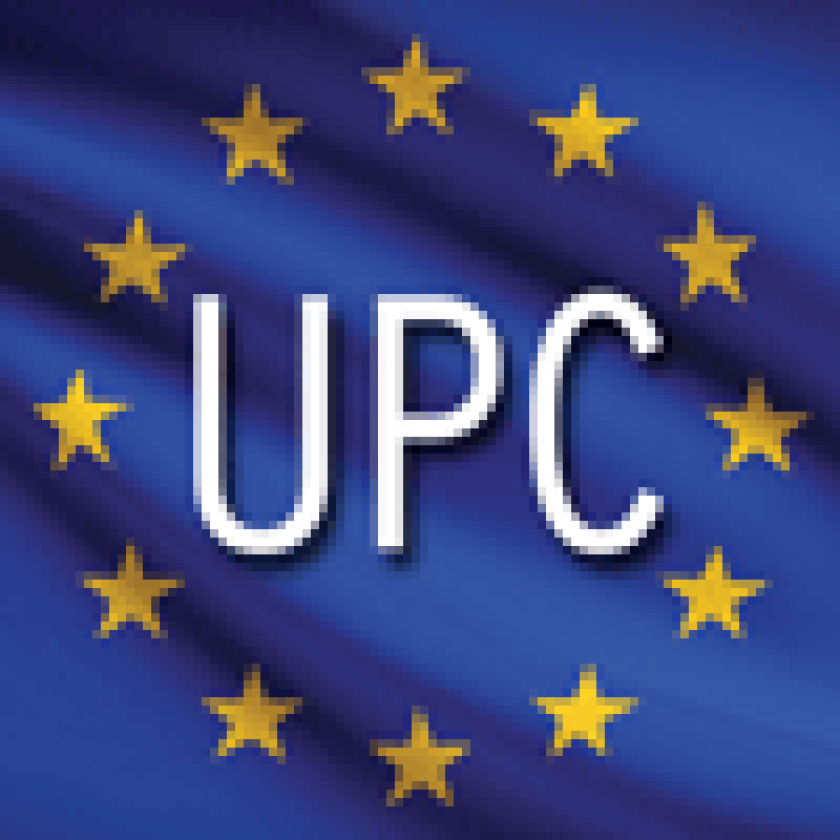The forums took place on November 30 and December 2, shortly after the UK government’s November 28 announcement that it will press ahead with ratification of the UPC Agreement. That statement had an impact on many of the panel discussions, and caused some last-minute redrafting of presentations and slides.
Here are some of the key points raised during the two events:
The UPC looms
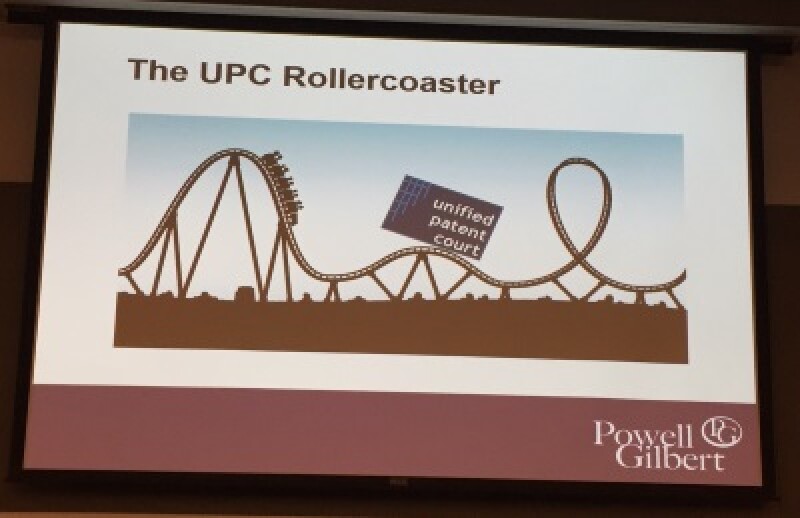
“I don’t make predictions anymore,” said Alex Wilson of Powell Gilbert at New York’s forum, as he considered when the UPC and Unitary Patent might come into effect. While the UK’s announcement represented an ascent on the long-running “UPC rollercoaster” there were more dips to come, including the actual ratifications in the UK and Germany, the question of what happens post-Brexit and the appointment of judges.
One of the strategic advantages of the UPC for patentees, said Leonard Werner-Jones of Hoffmann Eitle in New York, is the ability to opt-out existing European patents from the Court’s jurisdiction, and opt them back in (at no cost): “If you play your cards right, you can have the best of both worlds.” Andrew Hirsch of the International IP Institute was clear about the lesson from this: “I would opt out all the time because you can always opt-in.”
In Palo Alto, Bethan Hopewell of Powell Gilbert and Laura Kehoe of Keltie set out the details of the UPC and Unitary Patent respectively, while Kevin Brown of NVIDIA summarised the priorities for industry, including: cost, predictability and flexibility.
A new dimension for revoking patents
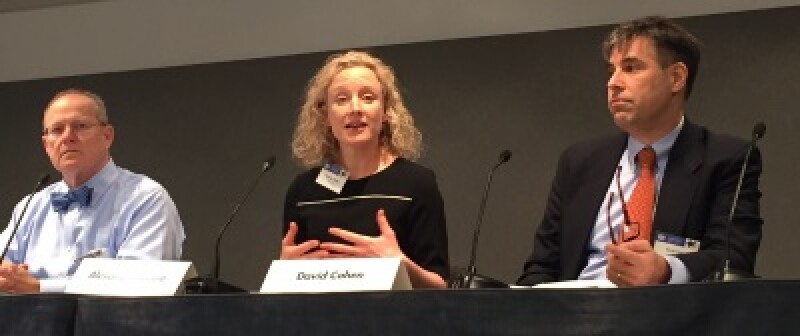
One of the biggest strategic changes when the UPC comes in will be the introduction of a new forum to revoke patents in the proposed Central Division, and the speakers addressed how this will compare with existing revocation options at the EPO and in national courts.
The advantages of seeking to revoke patents at the UPC are: no time limit; relatively low cost (about €20,000), no backlog so probably quick; potential for cost recovery. The downside is that you can only use it to attack a patent if it has not been opted-out by the patent owner.
By contrast, EPO oppositions have many merits, as Heli Pihlajamaa of the EPO explained in New York. These include: they cover all 41 states; speed is increasing with the Early Certainty from Opposition programme; and the experience of the Opposition Division. But an important restriction is the nine-month window in which they must be filed. About 4.4% of European patents are opposed, and about 40% of decisions result in the patent being upheld in amended form.
In New York, Leythem Wall and Lou Troilo of Finnegan led a discussion about the different options in Europe and the US. Paul Coletti of Johnson & Johnson compared the PTAB in the US with European proceedings, calling it “very very popular” and noting that 57% of appeals maintained in whole and 12% in part, so 70% (compared to 45-50% in US district court actions). He stressed that the 12-month deadline is being applied rigidly adding: “There is a certain amount of certainty that people are getting.”
In Palo Alto, Christoph de Coster and Chris Thornham of Taylor Wessing compared revocation rates and the nature of cases in the main European jurisdictions while Kimberley Schmitt of Intel provided a perspective from industry. Questions they addressed included the power to stay hearings and the assessment of the patent prosecution history.
A new arbitration option
-
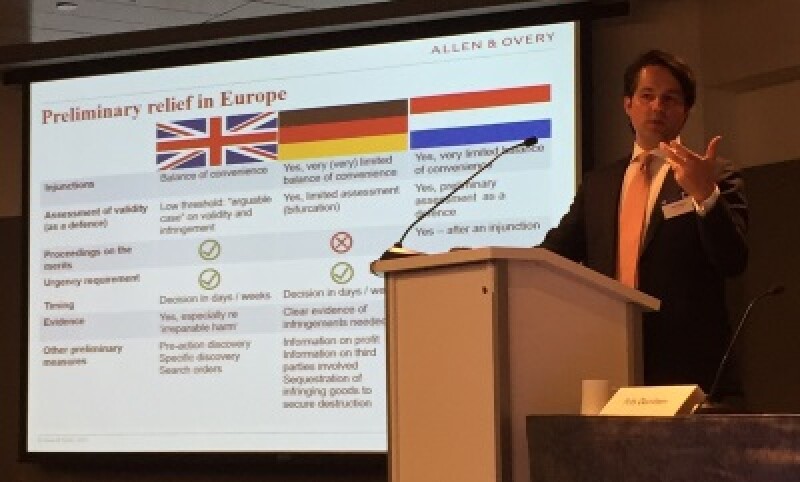
Enforcement session in New York One of the less analysed elements of the proposed UPC system is the Patent Mediation and Arbitration Centre (PMAC). Yet this could become important as the judge rapporteur in each case can encourage (but not force) parties to go there, as Caroline Casalonga of Casalonga explained.
Given that arbitration is rarely used in patent infringement/validity cases, the PMAC may appear to be of limited use. However, it may be valuable in damages hearings and another advantage is that cases in the Court are stayed, so arbitration could be used strategically.
There remain many open questions about the PMAC, including whether parties can bring in patent disputes from elsewhere, and where it would be enforceable (in the US?).
Industry speakers including Clemens Heusch of Nokia, Michael Krenicky of Novozymes North America, Bradley Perkins of Fingi and Victor Huang of eBay shared their stories of ADR generally, reporting some favourable experiences. “Mediation can be a great first step to get the parties together and see what the dispute is really about. Just having a neutral there can help break things down,” said Krenicky, while Heusch added: “I used to say mediation is a waste of time, but I am learning.”
Patent enforcement in the present
-
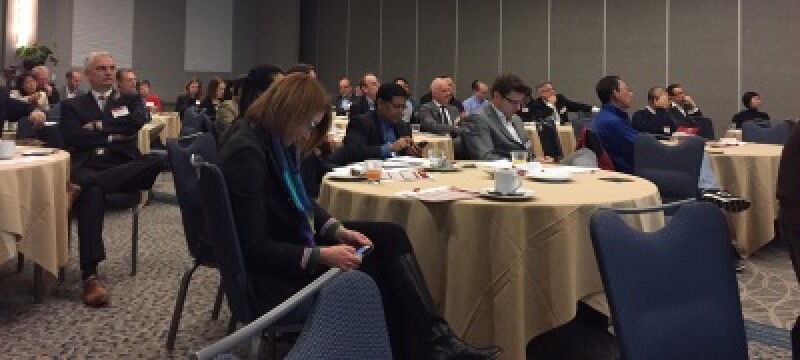
Audience in Palo Alto Enforcement in Europe can be expensive and complex, but is becoming strategically important given challenges in the United States – and is likely to become more so with the UPC. One of our panels looked at the existing systems for enforcement in Europe.
In-house counsel emphasised the strategic elements of forum shopping in Europe. “Where’s the company going? What are our competitors doing? There’s a lot of ways to leverage patents short of pulling the trigger and suing somebody” asked Bruce Elder of IDT while David Mason of Align Technology emphasised the importance of understanding the commercial objectives before triggering litigation: “Do as much due diligence as you can. Go through the trash.”
One of the attractions of litigation in Europe is “having judges with technical qualifications” said Diane Gabl Kratz of Seagate Technology: “In-house counsel love predictability." Clemens Heusch of Nokia pointed out that judges in Europe will consider rulings from other countries – even if they end up making a different decision. Indeed, the German Supreme Court has directed the lower courts to do exactly that.
In Palo Alto, there was a lot of discussion about discovery, including the use of Section 1782 orders: speakers and audience members agreed that these are generally too slow and cumbersome but, as Mark Heaney of Allen & Overy said: “Section 1782 may give you some power when you don’t have much.” The ITC may be more useful in some cases.
Manage your expectations when it comes to damages, said Philipp Cepl of Allen & Overy: awards in Europe are compensatory rather than punitive.
Evidence now and in the future
-

IT/TMT panel in New York Caroline Casalonga and Jurgen Neugebauer of Casalonga presented the details of France’s saisie contrefacon procedure, and the audience in both venues seemed surprised – even in some cases alarmed – at its power and scope. They were particularly interested in how patent owners should draft requests, how defendants can legitimately frustrate bailiffs making inspections and what powers bailiffs have to inspect electronic records.
Casalonga’s advice on how to greet a bailiff executing a saisie was notable: “If a bailiff arrives, call your lawyer. Never leave him along. Accompany him to take photos or samples. Try to limit him to the meeting room and be nice to him. Whatever you do it will be in the meeting report. Be cooperative.”
An intriguing question about the UPC is to what extent the evidence collection procedures will mirror those available in the saisie, and the speakers addressed questions including whether the court will favour ex parte orders, how widely the results of seizures may be used and whether there is any advantage to starting actions in countries with a tradition of the saisie (such as France and Belgium).
In New York, Matthew Golden of Mondelez Global presented a hypothetical case study where packaging was manufactured in Germany; the product was packed in France and stored in the Netherlands and Switzerland, and the panel discussed: where could you make a seizure? What precautions should you take? And what are the risks of doing so.
The F word
-
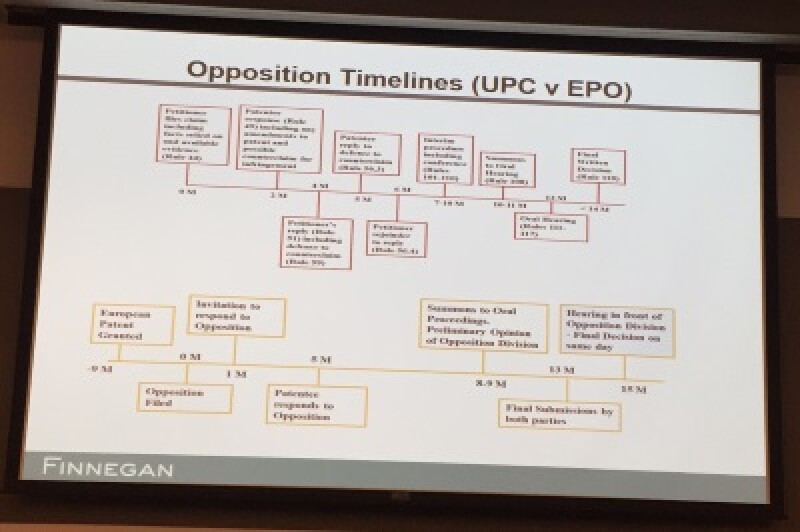
UPC and EPO oppositions compared Panellists on the litigating and licensing SEPs panel discussed how courts are interpreting FRAND following the 2015 Huawei v ZTE judgment from the CJEU. This ruling set out a series of steps to be taken by both patent owner and putative licensee in FRAND negotiations.
David Barron of Gowling WLG said that the guidance is binding, but it is up to national courts to interpret it: “A lot of the steps seem common sense to me … Participants in licences should behave like sensible business people.” Alexandra Brodie of Gowling WLG added that the judgment provides a “playbook” telling parties on both sides how to behave.
“As a licensee you can’t just say no – you need to come back with a specific proposal. Don’t be recalcitrant,” said Noah Mesel of Strategic Legal Advisers, while Brian Way of Dolby Laboratories noted that some subsequent decisions (particularly in Germany) have clarified the requirements on both sides, such as providing thorough claim constructions (patent owner) and making a full response (licensee): “It is a balance to make sure everyone is doing the right thing.”
There have been about 10 decisions in Germany since Huawei v ZTE include Sisvel v Haier (Dusseldorf) and Saint Lawrence v Deutsche Telekom and Vodafone (Mannheim), which took slightly different approaches. Another decision from Turin in Italy required that the licensing offer be made to a specific local subsidiary, rather than a parent entity. Costs have been an important issue in many cases.
In the UK, the big case is the pending Unwired Planet v Huawei, where hearings are about to conclude and a decision is expected early in 2017. Mesel, who formerly worked in-house at Unwired Planet, said the decision may address whether an offer is FRAND, the territorial scope of the court’s orders and standards declarations in the context of allegations of royalty stacking.
David Cohen of Vringo and Marc Sandy Block of IBM engaged in a lively discussion in New York on the merits of SEPs and non-SEPS, including questions about enforcement, declarations, portfolio licensing, policy and competition concerns and the merits of arbitration.
Biopharma bingo
-

UPC panel in New York Forum shopping is particularly relevant in biopharma cases, where obtaining evidence, regulatory issues and the ability to obtain injunctions are important. The likely advent of the UPC will add another layer to the existing options, and speakers in New York explored the implications of this, while noting that many biopharma patent owners are likely to opt out their key patents in the early years.
The speakers agreed that the UK is an attractive jurisdiction form the point of view of enforceability. “You get what you need in the UK – but often the UK is not done in isolation,” said Larry Coury of Regeneron. It may dictate what order you do things in or how they interact. By contrast, he said, Germany’s courts are quick but that can be bad news for defendants. “Germany is a good place to get preliminary injunctions,” added Neil Trueman of MundiPharma.
The panellists also noted the differences between small molecules and biologics. Cases involving the latter often involve questions of jurisdiction given the complex supply chains – and supply chains are normally not determined by IP considerations!
In Palo Alto, Alex Wilson and Bethan Hopewell of Powell Gilbert presented a hypothetical dispute (Innovate Pharma v Value Gx) between an innovative pharma company and a generic rival that raised issues around timing, evidence, remedies and jurisdiction. The hypothetical case eventually resulted in legal proceedings in the UK courts, with the generic celebrating a patent invalidity finding, but the branded company cheered that it had succeeded in maintaining its monopoly for as long as possible.
Troll heaven?
-

Revocation session in New York The likely impact of the UPC on the IT and TMT industries has been much debated, particularly in the context of whether it will be a heaven for patent trolls or indeed any entity asserting weak or invalid patents for nuisance purposes. In Palo Alto, Will Cook of Marks & Clerk noted that first movers may be able to shape UPC jurisprudence in these fields: “It may be worth a punt to take a case in this court.”
However, as Thomas Prock of Marks & Clerk said, national courts are likely to remain important, given that many patentees in the high-tech sector don’t validate in all countries, and national procedures are well established and predictable, even on issues such as the patentability of software.
In New York, speakers from industry discussed enforcement options. Jonathan Jung of iLuv Creative Technology said decisions “depend on budget and enforcement mechanism”: top priorities are UK and Germany, followed by (depending on the products) France and Spain. Ian MacKinnon of Nortek agreed on the importance of budget, saying: “You work out the cost of your filings, and then your accounts department says do it for 15% less!”
Given the growing difficulty of both obtaining and enforcing IT and TMT patents in the US, speakers compared the merits of protection in Europe, noting that it depends on value-for-money, competitors, timing and making predictions about where both law and technology are going (there was some discussion of the Internet of Things). As Maureen Kinsler of Marks & Clerk said: “It’s probably easier to get a software-related patent in the EPO than in the US now.”
Note that all speakers were speaking in a personal capacity, and not on behalf of their companies/organisations
